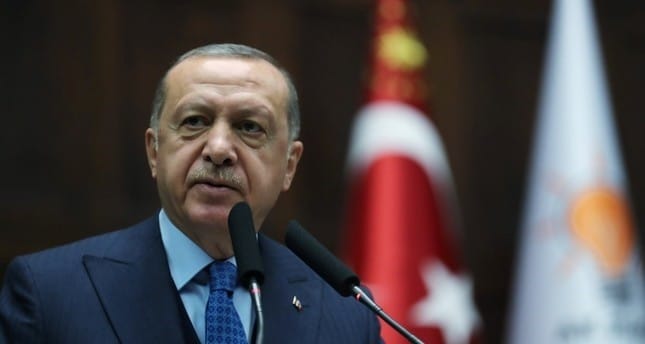Turkish President Recep Tayyip Erdoğan addresses his party’s meeting Ankara, December 25, 2018
Pushing back against US agencies, Turkey’s President Recep Tayyip Erdoğan has backed Donald Trump’s order for American military withdrawal from Syria — but said it must be done in cooperation with Ankara.
In advance of Tuesday’s visit by US National Security Advisor John Bolton, Erdoğan wrote in The New York Times:
President Trump made the right call to withdraw from Syria. The United States withdrawal, however, must be planned carefully and performed in cooperation with the right partners to protect the interests of the United States, the international community and the Syrian people.
Turkey, which has NATO’s second largest standing army, is the only country with the power and commitment to perform that task.
During a phone call with Erdoğan on December 14, Trump suddenly declared US withdrawal. When the Turkish President said — trying to get space for Ankara’s campaign against Syrian Kurdish groups — that the Islamic State is “99% defeated”, Trump replied, “OK, we’ll leave now.”
Five days later, Trump issued the order, leading to the resignation of Defense Secretary Jim Mattis and Brett McGurk, the US envoy to the anti-ISIS coalition.
But American agencies quickly began trying to pull back Trump’s decision, extending any timetable for departure from 30 days to four months. Bolton said Sunday that some US troops are likely to remain for month and even years, until ISIS is completely removed from Syria and there are assurances against attacks on the US’s Kurdish partners: the YPG militia of the Syrian Kurdish Democratic Union Party (PYD).
Erdoğan’s position was further complicated by the immediacy of Trump’s decision. Turkish forces were not in position to replace any US troops that quickly left Kurdish territory. So Ankara deferred Erdoğan’s long-promised offensive for the “erasure” of “terrorists”, on the pretext that it wanted to avoid “friendly fire” on American units.
Turkey considers the PYD and YPG to be part of the Turkish Kurdish insurgency PKK. Erdoğan and his advisors have been angered that both Bolton and US Secretary of State Mike Pompeo have warned in recent days of a Turkish attack against Syrian Kurds, emphasizing that the fight is with the PYD and YPG rather than Kurdish people.
Ankara’s Political Maneuver
Speaking in Israel on Sunday, Bolton said, “We don’t think the Turks ought to undertake military action that’s not fully coordinated with and agreed to by the United States.”
In his New York Times article, Erdoğan avoided any reference to military action against Kurdish factions — supported by the US since autumn 2015 to push back the Islamic State in northern and eastern Syria — and instead called for the replacement of PYD and YPG control with local councils: “[These] will largely consist of the Kurdish community’s representatives whilst ensuring that all other groups enjoy fair political representation.”
The Turkish President obscured his focus on the “terrorist” Kurdish groups by framing his appeal as one to “all stakeholders to join forces to end the terror unleashed by the Islamic State”.
Trump Flails
Beset by his shutdown of the US Federal Government and obsession with his Wall with Mexico, Trump flailed on Monday over Bolton’s pointer of a long-term US presence in Syria.
He lied that the National Security Advisor and US agencies were merely repeating his order from December 19 — and swept away his statement then and as recently as last week that the Islamic State had been completely defeated, leaving no necessity for a US presence.
The Failing New York Times has knowingly written a very inaccurate story on my intentions on Syria. No different from my original statements, we will be leaving at a proper pace while at the same time continuing to fight ISIS and doing all else that is prudent and necessary!…..
— Donald J. Trump (@realDonaldTrump) January 7, 2019
The Syrian Democratic Forces, in which the YPG is the leading faction, have reduced to the Islamic State to a pocket near the Iraqi border.
But the Pentagon and US agencies believe ISIS can quickly resurge, as with their lightning offensive that captured much of western and northern Iraq in 2014.
And Bolton and other American officials want a US presence to check Iranian influence in Syria, supporting their campaign to restrict or even remove the regime in Tehran.

